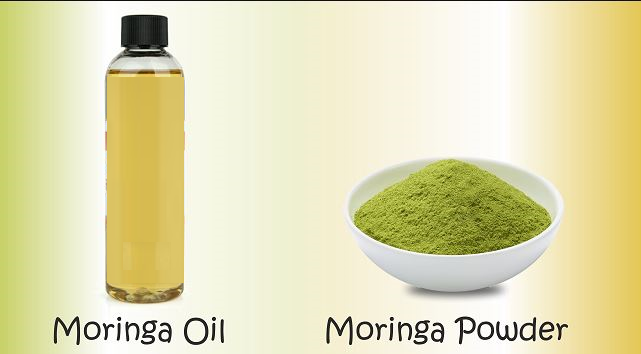Moringa Oleifera, commonly known as the "Miracle Tree," is a plant celebrated for its myriad health benefits. Two of its most popular derivatives, Moringa powder and Moringa oil, are hailed for their nutritional and medicinal properties. While both come from the same tree, they serve different purposes and offer unique benefits. This article delves into a comprehensive comparison between Moringa powder and Moringa oil, highlighting their differences in extraction, nutritional content, health benefits, and uses.
An overview of the distinctions between Moringa powder and Moringa oil
| Feature | Moringa Powder | Moringa Oil |
|---|---|---|
| Source | Dried and ground leaves of the Moringa Oleifera tree. | Extracted from the seeds of the Moringa Oleifera tree through cold pressing or solvent extraction. |
| Nutritional Content | Rich in vitamins A, C, E, calcium, potassium, protein, and antioxidants like quercetin and chlorogenic acid. | High in oleic acid, with some vitamins A and C, and noted for its moisturizing fatty acids. |
| Health Benefits | Boosts overall nutrition, has antidiabetic effects due to chlorogenic acid, and offers anti-inflammatory properties. | Promotes skin and hair health through hydration and anti-aging properties; supports heart health with oleic acid. |
| Primary Uses | Dietary supplement to enhance nutrition in smoothies, juices, teas, and baked goods; also available in capsule form. | Topical application in skincare and haircare products; occasionally used in cooking for its stability and nutritional value. |
| Extraction/Production | Involves drying and grinding, which preserves most nutrients. | Involves cold pressing or solvent extraction, focusing on oil yield from seeds. |
| Shelf Life | Generally stable; best used within 6 months to 2 years for optimal freshness. | Longer shelf life due to high antioxidant and fatty acid content; can last up to 5 years if stored properly. |
| Ideal For | Individuals looking to supplement their diet with a concentrated source of nutrients and antioxidants. | Those focusing on external applications for skin and hair health, or seeking a natural oil with moisturizing benefits. |
Extraction and Production
Moringa Powder: Moringa powder is made by drying and grinding the leaves of the Moringa Oleifera tree. This process preserves the vast majority of the nutrients, making the powder a concentrated source of vitamins, minerals, and antioxidants.
Moringa Oil: Moringa oil, also known as Ben oil, is extracted from the seeds of the Moringa Oleifera tree through cold pressing or solvent extraction methods. This process yields a clear, odorless oil rich in fatty acids and antioxidants.
Nutritional Content
Moringa Powder: Moringa powder is exceptionally rich in vitamins A, C, and E, calcium, potassium, and protein. It also contains a significant amount of antioxidants, such as quercetin and chlorogenic acid, which can help reduce inflammation and blood sugar levels.
Moringa Oil: Moringa oil is high in oleic acid, a monounsaturated fatty acid, which is beneficial for heart health. It also contains vitamins A and C, though in smaller quantities compared to the powder. The oil is particularly noted for its moisturizing and emollient properties, thanks to its fatty acid content.
Health Benefits
Moringa Powder:
- Nutritional Supplement: Moringa powder is often used as a dietary supplement to boost overall nutrition, especially for increasing the intake of vitamins, minerals, and antioxidants.
- Antidiabetic Effects: The chlorogenic acid in Moringa powder can help lower blood sugar levels, making it beneficial for people with diabetes.
- Anti-inflammatory Properties: The various antioxidants in Moringa powder can reduce inflammation, potentially benefiting conditions like arthritis.
Moringa Oil:
- Skin Care: Moringa oil is widely used in skincare for its hydrating and anti-aging properties. It can help improve skin texture, reduce wrinkles, and protect the skin from environmental damage.
- Hair Health: The oil is also applied to the hair to strengthen it, promote growth, and moisturize the scalp.
- Heart Health: The high oleic acid content in Moringa oil supports heart health by maintaining healthy cholesterol levels.
Uses
Moringa Powder: Moringa powder can be added to smoothies, juices, teas, and even baked goods to enhance their nutritional value. It's also used in capsule form as a dietary supplement.
Moringa Oil: Moringa oil is primarily used topically in skincare and haircare products. It can be found in moisturizers, serums, shampoos, and conditioners. Additionally, due to its stability, it's sometimes used in cooking, although less commonly than the powder.
Conclusion
While both Moringa powder and Moringa oil originate from the same beneficial tree, they cater to different needs and preferences. Moringa powder is an excellent choice for those looking to boost their dietary intake of vitamins, minerals, and antioxidants. In contrast, Moringa oil is ideal for individuals focusing on external applications, particularly for skin and hair health. Understanding these differences can help consumers make informed decisions about incorporating Moringa products into their health and wellness routines, maximizing the benefits of this versatile "Miracle Tree."

